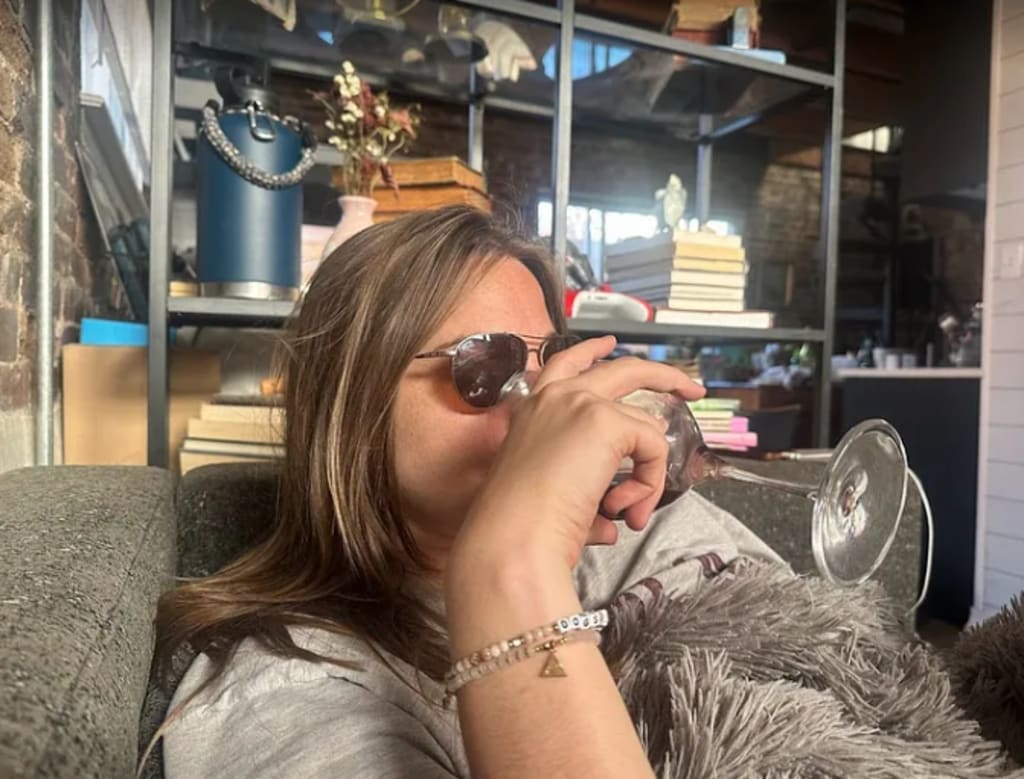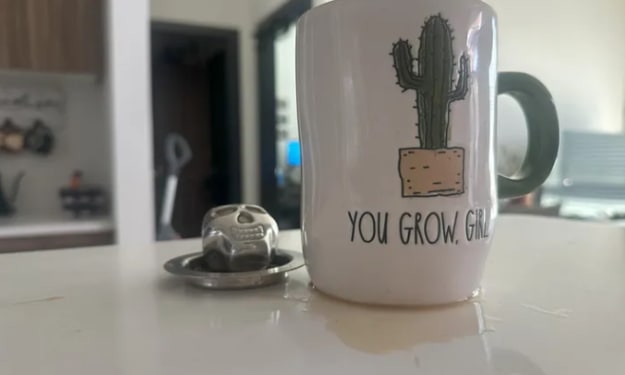Content warning
This story may contain sensitive material or discuss topics that some readers may find distressing. Reader discretion is advised. The views and opinions expressed in this story are those of the author and do not necessarily reflect the official policy or position of Vocal.
7 Reasons My Narcissist Accused Me of Cheating
An Exhausting (But Non-Exhaustive) List

1. Interacting with Others
- Smiling at a bartender as they took our order.
- Making plans with friends without him.
- Making plans with friends with him, but he’s bored.
- Being hit on by a stranger, completely unprompted.
My abusive, narcissistic, highly jealous former partner delighted in ruining the day anytime it wasn’t about him. Every interaction with others was an opportunity to make me prove my dedication to him while isolating me from people I cared about.
If I was trying to enjoy time with my loved ones, you could bet he was plotting to mess it up. This was especially true if the event was important to me.
Aside from baselessly accusing me of sleeping with any and everyone, other go-to methods of ruining social outings included: getting belligerently drunk so I’d have to leave early to take care of him, telling me I was being too loud anytime I expressed the smallest amount of enthusiasm, and telling bigoted “jokes” to shock others and embarrass me.
Another classic was starting a fight just before arriving at an event, then pretending to be in a great mood around others, making it look like I was upset for no reason.
2. Living in a Society
- Taking longer than expected to drive home.
- Failing to mention even the most insignificant detail about the course of my day: where I went, who I spoke to, whether I stopped for gas, etc.
- Forgetting to update him with the exact time I arrived at a location and the exact time I planned to leave.
Traffic? More like an opportunity to pull the car over and bone a total stranger.
On the rare occasion I left the house without him (mostly for work or errands), deviation from the plan for any reason was immediately suspect. Photo evidence of my exact location and company was a constant requirement, although even that didn’t save me from the wrath spurred on by his imagination.
It became my Sisyphean task to try to get this raging alcoholic to actually remember that I had, in fact, already told him I’d made plans to stop for groceries on the way home.
To this day, I catch myself saving receipts and snapping pictures at each destination in case I need to prove it later.
3. Existing Around Men
Note: I am, in fact, queer as hell. However, within the context of this relationship, I was only “allowed” to be attracted to women in the context of my narcissist’s fetishization.
- Talking to my coworkers or trying to befriend them in any way.
- The existence of male friends, coworkers, or acquaintances.
- Mentioning a previous relationship in a non-hateful manner.
When we first started getting to know each other, my abuser was obtrusively interested in the intimate details of my former relationships. He demanded to know my entire sexual history, including details that weren’t his business; like who I’d enjoyed being with most, who was biggest, and the specific acts I engaged in with each partner.
These questions went beyond intrusive, however, in the wooing stage he behaved as though this was normal. It turned out to be an intel-gathering mission. Anything I confided about my sexual history or relationships was later weaponized to manipulate and control me.
It became a requirement that I show the proper amount of shame for having previous romantic interests of any kind. If I didn’t talk shit about an ex, it had to be because I was still pining or seeing them behind his back.
Over time, this implication extended to any male in my life that I’d ever mentioned in a positive way. By the end of our relationship, I’d been forced to cut contact with pretty much anyone in my life who’d been deemed a threat to my abuser’s power.
4. Changing My Appearance
- Getting a haircut, wearing different makeup/perfume, or changing in any way that may have been perceived as pleasurable to other men.
- Buying new clothes.
- Owning or wearing unisex clothes that could have potentially belonged to a man at some point.
- Not shaving my body to his exact demands.
It won’t shock you to learn that my abuser had a lot of opinions on the way I looked and dressed. These expectations overrode anything I thought or wanted for my own body, as it existed to serve his urges.
He required that I look attractive enough to satisfy his gaze at all times, yet he enjoyed taking hits at my self-identity and self-esteem. When the requirement of looking good enough to please him resulted in positive attention from others, he delighted in throwing jealous tantrums.
Anything I did to improve my appearance was subject to backhanded compliments and, of course, suspicion. Changes as simple as embracing my natural curls were somehow twisted into a scheme to leave him for someone else.
This exhausting exercise felt like a constant failure on my part, but in reality, that was the point. The game was rigged; there was no correct answer.
5. Sex
- Masturbating without him.
- Wanting to try something new in bed.
- Attempting to deny his sexual advances for any reason.
I could never seem to give enough of my body to satisfy him; although we had sex nearly every day, sometimes multiple times a day, often against my will.
It was exceedingly difficult to find an excuse to get out of having sex that would be believed. Anytime I said no, he was certain it was because I was getting it from someone else. It was a guaranteed fight, one that would nearly always require me to placate him by giving in anyway.
And when I tell you about the screaming match we had the one time he caught me touching myself. Trying to find a moment of pleasure that didn’t benefit him was a betrayal akin to cheating.
6. Having “Freedom” of Movement
- Going to the gym alone.
- Going to work.
- Wanting to stay home alone when he went out.
- Going anywhere alone for any reason.
You, the sole shopper for our household, went grocery shopping alone? Better be able to prove it, bitch.
On multiple occasions, I caught my abuser driving through the parking lot of my gym, checking up on me.
When confronted, he tried to say I was imagining things (as if I didn’t know his license plate number), then eventually admitted that it had been him but it was fine because he was worried about my safety. He’d then turn the spotlight back toward me, saying that if I wasn’t doing anything shady then I shouldn’t mind if he showed up.
He’d sometimes show up at my place of employment because he happened to be in the area and wanted to surprise me. On several such occasions, he arrived blacked-out drunk and I had to beg him to sleep it off in my car until I got off work.
Please join me in cringing at the horrific memories of trying to laugh that off to my coworkers.
Although I’d eventually learn that he was cheating on me with multiple women, he was convinced I was the one somehow sneaking suitors past the security system and cameras he’d installed under the guise of safety (but which were often used to check up on me).
Do you know how suspicious it makes me look that I’m wigged out by people’s doorbell cameras and hyperaware of their pet cameras now? I’d never make it as a delivery person.
7. Owning Technology
- Being in the act of closing an app or webpage as he looked over my shoulder.
There was, quite simply, no way to recover from this one. No way to prove that what I’d been looking at was innocuous. Cancel any plans, the day was now ruined.
- Having my phone or laptop with me as I walked into another room.
- Smiling at my phone or laptop when he couldn’t see the screen.
- Any notification sounds he didn’t recognize.
- Receiving a call or text from an unknown number.
As his campaign to isolate me from the world wore on, my abuser became highly suspicious of my phone and laptop.
Especially once the pandemic hit, these devices were often my only unsupervised connection to the outside world for extended periods. This transformed each notification into a point of contention.
As a result, trust came to mean full access to all of my passwords, private messages, and notes. He became the self-appointed bouncer for who I was allowed to follow and what I was allowed to post on social media. By the end of our relationship, I’d unfriended dozens of people to avoid the arduous process of justifying every thumbs-up on every photo.
I learned to make my face as neutral as possible while checking my phone and not to check it too often. I did my best to make it clear that I had nothing to hide, not yet having found the courage to tell anyone what he was doing to me.
Even so, I was constantly tripping over myself attempting to explain how I could have dared to derive a moment of pleasure from anything on these devices (which were more or less my only connection to the outside world during this time) other than him.
Any call, notification, or tip-away of the screen was turned into a whole night’s supply of fruitless appeasement. More than a night, as he could decide to bring it up again whenever he wanted to see me squirm.
Once, he forced me to answer an unknown number that turned out to be a male friend I’d been forced to cut contact with trying to check that I was ok. That was an unfortunate evening, to say the least.
He Doth Protest Too Much
None of these overbearing, constantly shifting expectations or rules applied to my narcissist, of course. The double standards were freely acknowledged, his reasoning being that I needed protection as a woman and that it was everyone else he didn’t trust.
Meanwhile, he’d disappear for hours or entire days on benders and I was expected to trust him.
Turned out he was cheating on me with at least four women I’d been able to confirm, and honestly? Looking back, he was covering for it pretty lazily.
Unfortunately, making an accusation of any kind against him only somehow resulted in further restrictions on my movements and being labeled as “crazy”.
Conclusion: Navigating Life as an Imaginary Slut
It took years for me to finally understand that I was never the “crazy” one, nor was I the one who had to prove anything. I was being manipulated into not trusting my own mind and denying my instincts.
I’m still struggling to repair relationships that were harmed during this time, including the one with myself. Self-trust and self-isolation are things I struggle with to this day as a result of the manipulations he inflicted upon me. These are also common symptoms of CPTSD, a condition I was diagnosed with after my escape.
I take comfort in knowing that despite his best efforts, my body found ways of alerting me to what I knew to be the truth: I needed to get out. Admitting that in itself would have surely been categorized as a betrayal in his eyes.
Add it to the list.
About the Creator
Veronica Wren
Trauma sucks. Recovery shouldn't. Subscribe here for your FREE exclusive guided journal
❤️🩹 bio.link/veronicawren ❤️🩹
Domestic Abuse & CPTSD Recovery Coach
Enjoyed the story? Support the Creator.
Subscribe for free to receive all their stories in your feed. You could also pledge your support or give them a one-off tip, letting them know you appreciate their work.
Reader insights
Outstanding
Excellent work. Looking forward to reading more!
Top insights
Compelling and original writing
Creative use of language & vocab
Easy to read and follow
Well-structured & engaging content
Expert insights and opinions
Arguments were carefully researched and presented
Heartfelt and relatable
The story invoked strong personal emotions
Masterful proofreading
Zero grammar & spelling mistakes
On-point and relevant
Writing reflected the title & theme






Comments (1)
Thank you, Veronica, for having the courage to share your story. I feel for you because I too live with a form of PTSD known as CPTSD. It's not easy speaking out about abuse, but sharing your story also helps others. My thoughts and my love are with you, in your healing journey.